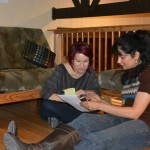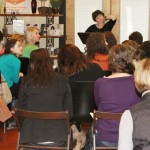Many of us writers seek the company of other writers. Within those communities, we look for mentors who aspire to go deep inside the story and who can show us how. We hope that, with the help of these mentors, found at retreats and writing centers, we might find our way into the complex lives of our characters, to learn to inhabit the world and to create complex themes that provide insight into themes of justice in an unjust world and hope in times of unbearable loss. Betheny Hegedus is a writer who found mentors and direction as a student of children’s and young adult writing at Vermont College but then she looked into her own backyard and discovered a space to bring aspiring and experienced writers together to form just this sort of community. I had the opportunity to learn more about Betheny’s Austin, TX retreat, The Writing Barn. But — here — I’ll let her tell you about this magic place….
The Writing Barn, located in Austin, TX, offers writer retreats, writing instruction and a rentable space for writers and artists. (Feel free to rephrase this so that it fits the way you would describe it.) Can you tell readers a bit about what sorts of workshops you’ve offered in the past?
Recently, we were just rented for a calligraphy workshop and we’ve had numerous book-themed baby showers and book launch parties. We have a fun one coming up with Jeff Crosby, for his new book Rockabilly Goats Gruff. There will be books, a rockabilly band, and treats galore. We’ve had Zen & Writing workshops, yoga and writing events, poetry, screenwriting, and more! Basically, we’re open to anything that is inspiring and insightful and we’re lucky that our space can be used in a variety of ways. Owen Egerton, author of How Best to Avoid Dying, just finished holing up at The Writing Barn to finish a new book he is working on. I love knowing that this space, which also houses our home, is used for celebration and creation.
Editor-turned-agent Alexandra Penfold, Sara Zarr and Francisco X. Stork all taught with us last year, as well as a ton of talent based here in Austin: Shana Burg, Saundra Goldman, Michael Noll, and Sara Kocek.
You have an MFA in writing for children and young adults and you teach at the Writing Barn and you also take lessons from faculty here. What is the value of novice and well-trained writers continuing to study and write in an environment like the Writing Barn?
If we are growing as a writer, we are always challenging ourselves: new genres, difficult themes we thought before “untouchable”—at least by us, and our in need of new eyes on our work. Always. Not only do I study and teach at The Writing Barn but so has Kathi Appelt. She is leading a Mastering the Middle Grade, Full Novel Revision Week with us this August, and also attended one of last year’s Advanced Writer Workshops, studying with Francisco X. Stork. Having a two-time National Book Award finalist and a Newbery Honor author amid the workshop attendees just goes to show you that our education and participation in workshops and classes is never, ever done. As writers, we are life-long learners.
In previous interviews about the way the Writing Barn came about, it sounds as  if is a sort of accidental dream with a space that almost found you. Would you describe how you discovered the barn and recognized its value to the writing and arts community?
if is a sort of accidental dream with a space that almost found you. Would you describe how you discovered the barn and recognized its value to the writing and arts community?
Ha, it’s true. The Writing Barn was my “inevitable ending,” as we novelists say. Everything in my life was leading up to it, but as the main character, I just didn’t see it coming. The man I was marrying, a long-term Austinite, had a piece of land with a horse-riding barn at the back of the 7.5 acres. As our house is small, he wanted to turn it into an office for me. As we did that, I looked at what was emerging and said, “This is for more than just me.” My husband had always wanted the property to be used for workshops and lectures, both spiritual and educational (he is a physicist who studies Sanksrit in his spare time) and like we did as individuals, our dreams merged and The Writing Barn, which sits next to the old horse riding ring, was born.
The Writing Barn is rooted in my passion for the power of stories, how they shape us, and how important it is to gather together in pursuit of goal, especially a long-term one such as writing and publication is.
Austin is an eclectic place and we’re not only a music capital but a place a literary hot-bed. It’s been amazing to see how and what we are adding to the writing community here in Texas and beyond, and just two years in we’re really just beginning.
What is your goal for writers who come to the Writing Barn?
I hope writers who come to The Writing Barn leave a workshop, class or retreat inspired by the work they have already done and the work they have yet-to-do. Honoring where we are in the process: whether a new writer getting pages down for the first time, or a career author, who is under deadline, is important. At The Writing Barn we have events that mix new and more seasoned writers and we offer separate events, as well. We’re not a “biz” oriented writing space. No “how-to-score an agent” workshops offered here. We’re focused on craft, on process, and the workshops and events we offer reflect that. We do talk about business topics on occasion, but they are in-depth and not offered as ways to lure writers in.
You have a breadth of genres in your publication history that includes middle grade novels and a new picture book. Your middle grade novels focus on traditional and nontraditional families. In March, you’ll have a picture book coming out called Grandfather Gandhi. While this picture book looks at family relationships the theme moves beyond family to learning how to live with peace. Do you think this broader world view might come from your own commitment to teach writers to dig more deeply into their stories?
Heavens, I hope so. Grandfather Gandhi, while an intimate family story of a world-leader, is truly a tool to help us learn from our anger. Gandhi didn’t believe anger was dangerous but that our reaction to it could be. We so often turn anger in on ourselves or direct it outwardly attacking others in thought or in action, what if we simply listened and tried to decode what our anger was telling us. Are we not feeling heard? Are we scared? Are we being treated poorly? If so, what can we change? How can we be heard? What next action should we take?
Those are all questions that are important to us as a human race, and in particular they are of importance to us as writers because our work is to explore and plumb the depths of the human experience. As a middle child, I saw my family role as “truth teller.” I talked about the hard stuff whether folks around me wanted to listen or not. I still do. I see that as the real role of a writer, “to tell the truth” whether it be in fiction, poetry, or non-fiction. An emotional truth hits us hard. We feel it. Sometimes we don’t want to go near it, but it’s important we do. The Writing Barn as a space honors that and we create and respect emotional truths.
Do you believe your own writing has been changed by your work as director of the Writing Barn?
It has immensely. After an intensive time spent working with a fantasy writer, I am now writing a dark YA circus fantasy. It explores themes I never was called to touch before: religion, belief, the power of intention. The student I was working with is an illustrator and her fantasy world was rich in setting and ambiance but needed a strong character arc. I had never thought about writing fantasy before but after being within the world of her book, as her mentor, it changed me. Soon, I wanted to stretch my exposition skills to balance a world of strange beauty with a deep character quest and here I am doing it! Diving in the deep end!
Our workshops thus far, haven’t been genre based, as we usually have a mix of various types of work: historical, contemporary, thriller, fantasy, fairytale, etc. But we may have some genre based themed weekends in the future.
Do you ever provide scholarships?
Oh, how I want to! There is a plan in action for that for the future. Another goal of mine is to sponsor grants through writing organizations, such as the SCBWI or WLT, to offer writers the opportunity for long-term retreats with us, stays of 2 weeks to a month to finish a particular project.
Now that we have two interns joining our staff, we have the man-power (lady power really) to start quarterly free events. We’re in the process of brainstorming a Picnic Panel, where writer’s can brown bag it and sit under the Live Oaks and listen to a panel discussion.
What do writers tell you they take away from workshops and events at the Writing Barn?
The feedback has been crazy-good. Usually after an event, we receive thank you cards! I call the fun feedback, “Writing Barn Raves.”
Here are a few:
“Writers deeply hunger for a beautiful space and the quiet where they can connect with themselves, others, and their work. Bethany (at The Writing Barn) must find her deep gladness in providing such a space.”
Award-winning author, Sara Zarr
“It’s not just that The Writing Barn is a refreshing setting in a hot state — it’s the sense of community there that makes it so special.” MT Anderson, National Book Award winner
“Before you even unpack your bags, you know you won’t want to leave.” Betsey Devaney, author
“The beautiful setting, the cozy accommodations and Bethany’s easy hospitality, all combine to create an atmosphere where creative inspiration runs rampant. I love every visit to the Barn, and always leave feeling refreshed.” Christina Mandelski, author
“The Barn is the sort of place inspiration doesn’t just strike—it hangs out for days, soaking into the wood, settling into the sofa cushions, waiting for writers to pull up a chair.” Nikki Loftin
“The Writing Barn offers classes and community for talented, giving and caring writers. Hemingway had Paris. We have The Writing Barn. And believe me, magic happens there.” Sue Cleveland, painter/writer
As I said, crazy-good. After our workshops, we send out surveys and one time the constructive feedback made me laugh. In a hurry, I had bought grapes that had seeds for our Triple Threat event, where we had three lectures on voice, offering different perspectives from Kathi Appelt, Uma Krishnaswami, and Susan Fletcher, one written comment was that it was hard to eat the grapes and mingle but if the worst thing that could be said about the event was “buy seedless grapes” we were doing pretty good!
Recently, you began a blog at The Writing Barn that focuses on “Rejecting Rejection.” Why this topic?
As writers we can’t get away from rejection. I got two passes on a novel last week at the same time as two starred reviews rolled in for Grandfather Gandhi. We writers sometimes share about rejections in person but rarely do we do it online. I wanted to begin a conversation where we wouldn’t be ashamed of the “no’s.” We all get them, at every stage of our careers. They don’t mean we’re not talented, or not good enough. A no is a step to a yes, and I’ve had a ladder full no’s to climb and I always get something from them, even if they sting a bit when they come. But the one no, I don’t ever want to get is a no from myself.
We run the “Rejecting Rejection” series every Monday and as the pieces come in, behind the scenes, I am so inspired. Each essay is different but each makes me want to yell YES and pump my fist in the air. I hope readers of the series feel the same.
What’s new at The Writing Barn?
Tons! This spring, the Book House will open. It has five bedrooms and five baths. The bedrooms are named after big literary prizes: Booker, Pulitzer, Newbery, Caldecott and Printz and the award-winning books will be on the bedside tables. Each bed will also have a lap desk, so writers can roam the grounds. It’s going to be awesome and hopefully it will be ready to open while the Texas bluebonnets are still in season.
Can you tell readers about upcoming workshops?
We have three Advanced Writer Workshops this year. Our first is in May with Jo Knowles and Robin Wasserman, and they are tackling revision with Discover the Beating Heart of Your Book. In October, agent/author Ammi Joan Paquette and K. A. Holt will be with us for Writing Outside the Box: Multiple Viewpoints, Unreliable Narrators, Unusual Structures—Oh My! And in December, best-selling authors and friends Jenny Han and Siobhan Vivian will be with us.
There’s the Full Novel Revision week, with Kathi Appelt, Rita Williams-Garcia, Shana Burg and myself in August. And in September, best-selling picture book agent Erin Murphy with two of her clients, Audrey Vernick and Liz Garton Scanlon lead The Complete Picture Book Workshop.
Those are the programs writers from around the country will travel in for. We also have lots going on locally and for writers here in Texas.


2 comments for “The Writing Barn provides a place to grow our writing and our art”